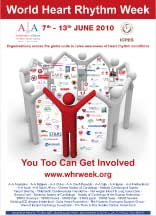
Findings presented at Heart Rhythm 2010 showed that stopping atrial fibrillation—whether through medication, surgery, or in the case of this study, catheter ablation— could potentially prevent the risk of developing Alzheimer’s disease and other dementias and also reduce the risk of stroke and death. Doctors John D. Day, MD, and T. Jared Bunch, MD, at …
Read More


